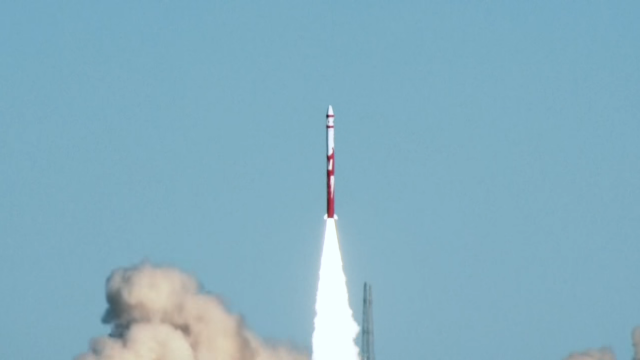The craft that would have been the first private Chinese rocket to deliver a satellite into orbit around the Earth failed on Saturday, the Guardian reported, with something going wrong with the Landspace Zhuque-1’s third-stage deployment.
It’s not clear exactly what went wrong, though videos of the incident make clear that its payload—a satellite called “Future” that was intended to be used in operations for the state-run China Central Television network—didn’t really appear to have much chance of reaching orbit.
China’s first private-sector commercial launch vehicle, Zhuque-1, developed by Beijing-based private space company LandSpace, failed to send a satellite into orbit after being launched from Jiuquan Satellite Launch Center in NW China’s Gansu on Sat. No other details are available pic.twitter.com/DOKozEnfX3
— Global Times (@globaltimesnews) October 27, 2018
Landspace fails to reach orbit with milestone private Chinese launch https://t.co/kFGsnGA5za pic.twitter.com/WKyCZ3wyxv
— SpaceNews (@SpaceNews_Inc) October 27, 2018
The Weila-1 (Future) micro satellite that will be launched on Landspace’s Zhuque-1 flight on October 27 is based on the MN10 platform developed by Beijing MinoSpace Technology, founded in 2017. Sat will has mass of 10-30 kg. https://t.co/EXO3KM0QEO launch: https://t.co/LSwbhIe8Ov pic.twitter.com/6L2f7NR1Uj
— Andrew Jones (@AJ_FI) October 22, 2018
The Guardian wrote that Landspace did not elaborate on the nature of the failure:
The three-stage rocket, Zhuque-1, was developed by Beijing-based Landspace. The company said in a microblog post after nominal first and second stages that the spacecraft failed to reach orbit as a result of an issue with the third stage.
The company said that “cowling separation was normal but something abnormal happened after the second stage.” The statement on its Weibo social media account did not elaborate.
According to SpaceNews, the Zhuque-1 rocket cost approximately $US14 ($20) million to develop and was approximately 62 feet (19 meters) tall, with a weight of just short of 30 U.S. tons. It was developed as part of a Chinese private spaceflight push that has been ongoing for years, with at least 10 domestic companies vying to enter the marker. Rival OneSpace test-fired fourth-stage engines for its OS-M rocket earlier this month, SpaceNews wrote, and is planning on launching a payload to orbit by the end of this year after becoming the first private Chinese company to launch a rocket to space in May 2018.
“Reliability is only built up over time, and therefore launch cadence and experience will have to be acquired before reliability can be truly assessed for Landspace or any other launch company,” Ohio State University aerospace expert John Horack told SpaceNews. “One should expect failures, as this is not an easy business. SpaceX, Orbital, Virgin, and others have all dealt with this…. early failures can sink a company almost before they start.”
SpaceNews added that it is unclear whether the failure of Saturday’s launch spells doom for Landspace’s more grandiose ambitions, which have included a much larger Zhuque-2 model:
The two-stage Zhuque-2 (ZQ-2), which Landspace aims to manufacture next year and launch for the first time in 2020, will measure 48.8-meters tall with a diameter of 3.35 meters and be capable of delivering a 4,000-kilogram payload capacity to a 200-kilometer low Earth orbit and 2,000 kilograms to 500-kilometer SSO, using 80-ton and 10-ton methalox engines.,,, Landspace had announced plans to further, larger Zhuque-2 series three-stage rockets—using variable thrust engines to allow attempting vertical landings and reuse of first stages—capable of carrying up to 32,000 kilograms to 200-kilometer low Earth orbit.
(For comparison, those plans for the advanced Zhuque-2 model would have a payload capacity somewhere between SpaceX’s Falcon 9 and the Falcon Heavy, which is really quite a high bar.)
While this was a setback for Landspace, it wasn’t as dramatic a failure as Interstellar Technologies’ attempt to be the first Japanese company to launch a rocket into space in late June, when its MOMO-2 rocket barely got off the launch pad before falling back down and exploding.
